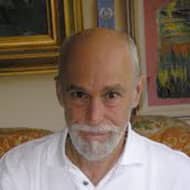Since the internet is obviously a game-changer, in and of itself, it's worth noting how the Net is intrinsically Buddhist -- in its interconnectedness, and unique, many-to-many ability to facilitate community (sangha). I continue to ponder this synergy of Buddhism and the internet. For instance, as the Net seemingly erases geographic borders, different regional traditions of Buddhism are now able to learn of each other. Joseph Goldstein has termed this new path One Dharma. For some, this can mean an opportunity to explore and find a tradition to which to fully commit; for others, an abundance of practices to mix and match.
Ecumenism crops up frequently in these articles. In the light of the Net, I find it telling in the entry from Silicon Valley, "Hahayana," by Chade-Meng Tan. That is, I wonder whether his integration of teachings from three major, differing groupings of Buddhist traditions might stem from not only the globalization of the Net, but also social media's relaxing of single-focus dominance in exchange for a harmonic diversity of voices. In any event, as Philip Ryan makes clear, while Buddhist teachings continue to be face-to-face (f2f), they're also taking place now with teacher and student in separate environments ("distributed education"). But we can no more know all the ramifications of this paradigm shift than a fish can know water.
Science is another big litmus of paradigm shift. (T.S. Kuhn inscribed the phrase there.) Here too Buddhism is part of the equation, be it quantum or biological. As Buddhists incorporate findings of psychology and neuroscience in their practice, Newtonian science is discovering a different empiricism of Buddhism, such as a moving away from trying to tabulate and label things and toward the study of interrelationships amongst things -- what Buddhist teacher Thich Nhat Hanh calls interbeing.
Whoever opens to contemplative practice often has a marvelous discovery in store. Mind can quiet down, on its own -- and how that opens onto a more genuine way of living. In our hyperactive culture we can easily forget how this capacity is innate, available to everyone, our birthright. Indeed, here's a key radical message of the Buddha. Under the sheltering tree at which Siddhartha merited the title of Buddha (awakened), as he truly awoke, he discovered the seeds of awakening are present in all beings. (Even a stumblebum like me.)
So, to return to the larger contemplative practice movement, millions today are learning Buddhist practice without reference to any religious tradition. We hear, instead, "relaxation response" . . . "emotional intelligence" . . . "mindfulness." A topic for future study is how far can the Dharma be adapted and still be called Buddhist. And, as psychology and Buddhism ally, to mutually ameliorate, reduce, and transform needless suffering -- a monastic contributor, Venerable Jaguang Sunim, here cautions however that Buddhism is not therapy (nor "self-help," as it eliminates selfhood entirely to realize non-self).
Three more items. One, it's important to think we have a future at all. For a future to be possible, as Shifu Sheng Yen and Professor Christopher Queen show us, is to engage and untangle the knot of inner and outer freedom -- personal and societal -- as one. The future is not an individual matter.
Two, as Stephen Levine reminds us, it's ultimately salutary to realize that such words here as culture and ideology, tradition and innovation, globalization and gender, and even Buddhism are provisional frames, concepts. Find their meaning in life experience, not abstract theory; the map is not the territory.
And, three, amplifying Natascha Bruckner's mystic account of her experience of oneness with others: to see Buddha in our century may be as community (sangha) in our coming together in his name; not only eye-to-eye but also as in this bevy of Buddhists, right at your fingertips.
Please enjoy. In these texts gleams the ore of a golden chain. Besides contributors I've referenced, there are many other fine reflections for your consideration, without any of which this would not cohere. These were but some initial thoughts, as I turn this quick, eclectic collection over to Patheos, and to you, for whom it's been, indeed, an honor to serve. Please see for yourself. Let us know what you think.





